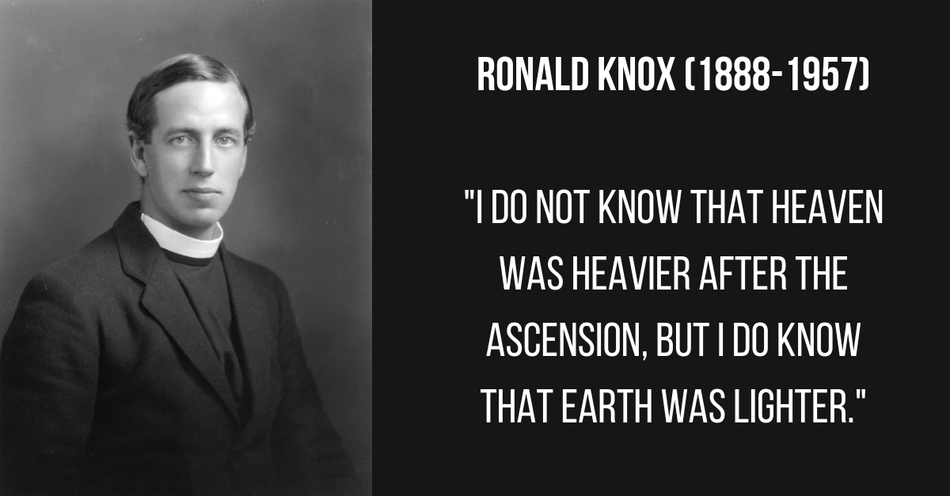Ronald Arbuthnott Knox (1888-1957) may not be as well-known as his colleague G.K. Chesterton, but he was just as much a renaissance man. Knox’s full-time job was as a chaplain... but he found time to give sermons and radio talks, translate classic Christian works, and write apologetics, cultural commentary, satire, detective novels, and church history. When he died, The Catholic World contributor Michael de la Bedoyere wrote, “the death this summer of Msgr. Ronald Knox has deprived the English-speaking Catholic world of, perhaps, its most eminent contemporary writer.”
Here are the crucial details about Ronald Knox’s life and career.
10 Important Events In the Life of Ronald Knox
1. On February 17, 1888, Ronald Knox was born in Kibworth, Leicestershire, England. His father, Reverend Edmund Arbuthnott Knox, was a prominent Anglican priest who later became the Bishop of Manchester. His father claimed that Knox was reading Virgil at six years old.
2. In 1911, Knox presented “Studies in the Literature of Sherlock Holmes” at the Gryphon Club. A tongue-in-cheek lecture in the style of German higher criticism theology, the paper discusses whether Dr. Watson made up all the stories about Holmes escaping death.
3. In 1912, Knox was ordained as an Anglican priest and became a chaplain at Trinity College, University of Oxford. He kept the position until 1916.
4. In 1913, Knox published Some Loose Stones, his first serious book on religion.
5. In 1917, Knox converted to Roman Catholicism. Over the next decade, Knox became an ordained Roman Catholic priest and counseled Chesterton as he considered joining the Roman Catholic Church.
6. In 1925, Knox’s first detective novel, The Viaduct Murder, was published.
7. In 1926, Knox became a chaplain for Catholic undergrads at the University of Oxford.
8. On January 16, 1926, Knox hosted a parody of a BBC radio news report titled “Broadcasting from the Barricades,” allegedly describing riots in London. Many people missed the joke (partly because a snowstorm the next day delayed newspaper reports).
9. In 1929, Knox wrote the Ten Commandments of Detective Fiction, published as an introduction in The Best English Detective Stories (1928).
10. In 1939, Knox left the Oxford chaplaincy for a smaller one in Aldenham. He began a new translation of the Vulgate Bible, which was highly successful when published in 1945-1951.
10 Important Quotes by Ronald Knox
Since Knox was a prolific writer in many genres, it’s hard to pick just a few worthwhile quotes. These quotes are taken from his nonfiction work.
1. “In order to give something to God, we forgo, not the sinful pleasures which we have no right to in any case, but the lawful pleasures which he has given us to enjoy if we will.”—Occasional Sermons of Robert A. Knox
2. “The omniscientists are not clear what they mean to give us in the place of religion.”—Broadcast Minds
3. “What I have written does not belong to me. If I have written the truth, then it is ‘God’s truth’; it would be true if every human mind denied it, or if there were no human minds in existence to deny it.”—preface to an unfinished book on apologetics, quoted in The Life of Ronald Knox
4. “The process of coming to believe in particular doctrines and then coming to change your view is not, in real life, a strict logical process, with ergo’s and distinguisho’s for its milestones. Your religion builds itself up you know not how; some habits of thought stepped into unconsciously, others imbibed from study, others acquired by prayer.”—A Spiritual Aeneid
5. “Humility, rather than want of faith, made Gideon ask for a sign, a miraculous sign, that this strange vocation was really meant for him. And Almighty God saw fit to indulge his request.”—Miracles
6. “…the totalitarian Government does not tolerate criticism, from whatever quarter, any more than it tolerates independent political action.”—Nazi and Nazarene (MacMillian War Pamphlets #5)
7. “Let him ask, not how I did the thing, but how I thought the thing ought to be done. Often he will disagree, but his own ideas will be clarified, none the less, by the effort of disagreement.”—On Englishing the Bible
8. “Hard hearts, not broken hearts, are the world’s tragedy.”—The Pastoral Sermons
9. “Christian thought, if you will look deep enough, is always turning out to be the via media between two opposing forms of error.”—The Hidden Stream
10. “Charity edifies; recognizes that it has a duty to the souls of others.”—Enthusiasm
10 Things You Should Know about Ronald Knox
It's easy to talk about prolific writers, but harder to discuss their full lives. Some details inevitably get left out. Here are some things you likely didn't know about Ronald Knox, even if you're very familiar with his life:
1. He played an important role in detective fiction. Knox admitted he didn’t always follow his Ten Commandments of Detective Fiction (commandments like “the detective must not himself commit the crime”). Still, these commandments had a huge impact on Golden Age Detective Fiction. One year after his commandments were published, Knox joined the Detection Club, which accepted them as unofficial bylaws. G.K. Chesterton was the Detection Club’s first president. Other noted members included Agatha Christie and Dorothy L. Sayers.
2. He entered the family business. While Knox wasn’t pressured to become a priest or a writer, both vocations were common in his family. Both his father and his brother Wilfred were Anglican priests who wrote books on religious history. His brother Edmund wrote poetry and satire and edited Punch. His sister Winifred wrote 25 books, including seminal detective novels and a King Louis IX biography. His brother Alfred wrote at least one poem and co-wrote a commentary on the Greek poet Herodas.
3. He worked in espionage. Because Knox had reservations about priests taking lives, he didn’t enlist in active service when World War I started. From 1916 to 1918, he worked for Military Intelligence in a division that read foreign newspapers to trace enemy propaganda in neutral countries. His brother Alfred also worked in intelligence—as a codebreaker in both world wars.
4. He was a contemporary of C.S. Lewis. Knox’s two periods as an Oxford chaplain coincided with C.S. Lewis’ Oxford years teaching at Magdalen College. They didn’t know each other well, but they met in the 1930s through Dr. Humphrey Havard. When they met, Lewis reportedly called Knox “possibly the wittiest man in England.” Milton Walsh’s book Second Friends analyzes what they had in common.
5. He anticipated Orson Welles. “Broadcast from the Barricades” had many jokes written into the script, was announced a week earlier in The Radio Times, and had an opening statement that the program was fictional. Despite this, several hundred panicking people called the authorities. A decade later, Orson Welles’ War of the Worlds program created a similar panic.
6. He (basically) invented Sherlock Holmes scholarship. Knox’s paper about Sherlock Holmes was satire but one of the first attempts to analyze Arthur Conan Doyle’s stories. Its popularity kickstarted Sherlock Holmes studies and made Knox famous in a way he disliked. Years later, when an editor sent him a book about Sherlock Holmes to review, Knox replied, “I can’t bear books about Sherlock Holmes… it is so depressing that my one permanent achievement is to have started a bad joke. If I did start it.”
7. He was a scholar as well as a writer. While Knox’s detective stories and apologetics have aged best, he was also a serious scholar. His book Enthusiasm overviews 17th- to 18th-century religious “enthusiast” groups like the Quakers, Anabaptists, and Methodists. He also translated The Story of A Soul by St. Therese of Lisieux and contributed to a translation of The Imitation of Christ by Thomas a Kempis.
8. He was careful about his job. Biographer Evelyn Waugh notes that Knox was deliberate about his job as an Oxford chaplain: he was there to counsel Catholic students, not evangelize or comment on political parties. Waugh suggests this made Knox unique for his time.
9. He was a subtle spiritual advisor. Knox counseled four generations of Catholic undergraduates at Oxford, taking many in as lodgers. One lodger, David Walker, observed that it wasn’t until later he realized how important Knox was: “It was only when we looked back that we realized how much this hopelessly shy, quiet creature had affected our thinking.”
10. He never phoned it in. Giving regular guest sermons takes a lot of work, and many priests reuse material. Waugh wrote that Knox “seldom repeatedly exactly the same sermon.” Philip Caraman confirms this in his introduction to a collection of Knox’s sermons: “When he was asked to preach to the same congregation a second or third time his sermon on each occasion was anew.”
Sources
Unless otherwise noted, the quotes in this article come from the following resources:
The Occasional Sermons of Ronald Knox edited by Philip Caraman
The Life of Ronald Knox by Evelyn Waugh
The Quotable Knox edited by George J. Marlin, Richard P. Rabatin, and John L. Swan
Further Reading:
Mr. Chesterton Made His Confession
10 Things You Need to Know about the Inklings
Therese of Lisieux's Act of Oblation
Thomas á Kempis, Priest, Monk, and Writer
Photo Credit: Graphic by G. Connor Salter. Picture of Ronald Knox via Wikimedia Commons/Ronald Knox Society

This article is part of our People of Christianity catalog that features the stories, meaning, and significance of well-known people from the Bible and history. Here are some of the most popular articles for knowing important figures in Christianity:
How Did the Apostle Paul Die?
Who are the Nicolaitans in Revelation?
Who Was Deborah in the Bible?
Who Was Moses in the Bible?
King Solomon's Story in the Bible
Who Was Lot's Wife in the Bible?
Who Was Jezebel in the Bible?
Who Was the Prodigal Son?









